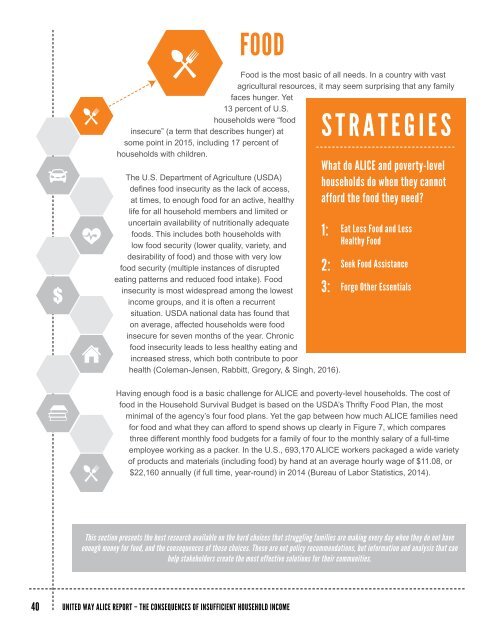The Consequences of Insufficient Household Income
This new Consequences of Insufficient Household Income report provides a deeper level of understanding of the choices that ALICE and poverty-level families across the country make when they do not have enough income or assistance to afford basic necessities, and the consequences of those choices.
This new Consequences of Insufficient Household Income report provides a deeper level of understanding of the choices that ALICE and poverty-level families across the country make when they do not have enough income or assistance to afford basic necessities, and the consequences of those choices.
Create successful ePaper yourself
Turn your PDF publications into a flip-book with our unique Google optimized e-Paper software.
FOOD<br />
insecure” (a term that describes hunger) at<br />
some point in 2015, including 17 percent <strong>of</strong><br />
households with children.<br />
<strong>The</strong> U.S. Department <strong>of</strong> Agriculture (USDA)<br />
defines food insecurity as the lack <strong>of</strong> access,<br />
at times, to enough food for an active, healthy<br />
life for all household members and limited or<br />
uncertain availability <strong>of</strong> nutritionally adequate<br />
foods. This includes both households with<br />
low food security (lower quality, variety, and<br />
desirability <strong>of</strong> food) and those with very low<br />
food security (multiple instances <strong>of</strong> disrupted<br />
eating patterns and reduced food intake). Food<br />
insecurity is most widespread among the lowest<br />
income groups, and it is <strong>of</strong>ten a recurrent<br />
situation. USDA national data has found that<br />
on average, affected households were food<br />
insecure for seven months <strong>of</strong> the year. Chronic<br />
food insecurity leads to less healthy eating and<br />
increased stress, which both contribute to poor<br />
Food is the most basic <strong>of</strong> all needs. In a country with vast<br />
agricultural resources, it may seem surprising that any family<br />
faces hunger. Yet<br />
13 percent <strong>of</strong> U.S.<br />
households were “food<br />
health (Coleman-Jensen, Rabbitt, Gregory, & Singh, 2016).<br />
STRATEGIES<br />
What do ALICE and poverty-level<br />
households do when they cannot<br />
afford the food they need?<br />
1:<br />
Eat Less Food and Less<br />
Healthy Food<br />
2: Seek Food Assistance<br />
3: Forgo Other Essentials<br />
Having enough food is a basic challenge for ALICE and poverty-level households. <strong>The</strong> cost <strong>of</strong><br />
food in the <strong>Household</strong> Survival Budget is based on the USDA’s Thrifty Food Plan, the most<br />
minimal <strong>of</strong> the agency’s four food plans. Yet the gap between how much ALICE families need<br />
for food and what they can afford to spend shows up clearly in Figure 7, which compares<br />
three different monthly food budgets for a family <strong>of</strong> four to the monthly salary <strong>of</strong> a full-time<br />
employee working as a packer. In the U.S., 693,170 ALICE workers packaged a wide variety<br />
<strong>of</strong> products and materials (including food) by hand at an average hourly wage <strong>of</strong> $11.08, or<br />
$22,160 annually (if full time, year-round) in 2014 (Bureau <strong>of</strong> Labor Statistics, 2014).<br />
This section presents the best research available on the hard choices that struggling families are making every day when they do not have<br />
enough money for food, and the consequences <strong>of</strong> those choices. <strong>The</strong>se are not policy recommendations, but information and analysis that can<br />
help stakeholders create the most effective solutions for their communities.<br />
40 UNITED WAY ALICE REPORT – THE CONSEQUENCES OF INSUFFICIENT HOUSEHOLD INCOME




